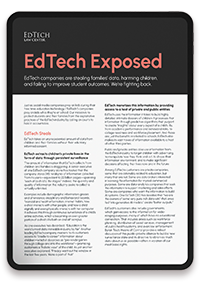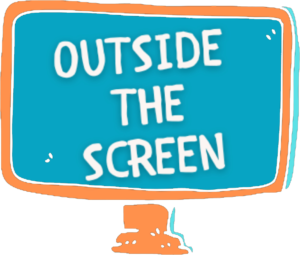Working to protect students, parents, teachers, and schools from the exploitative practices of the EdTech industry
If you have a problem where school meets technology, we’re here to help.
Contact us for a free case evaluation

What is EdTech?
EdTech companies provide digital technologies to individuals, schools, and school districts that range dramatically in purpose and function. And the industry’s reach is far and growing, which spells trouble for children.
The kinds of harm children suffer by EdTech vary by product type. Click here to view a categorical breakdown of the primary EdTech software and platforms.
EdTech Overview
- There are more than 25,000 companies in the K-12 EdTech industry operating the U.S.
- The global EdTech industry is valued at more than $250B and is projected to nearly triple by 2027.
- School districts use on average about 2,600 EdTech products.
- Nearly all EdTech apps share students’ personal information.
- Schools and EdTech companies are prime targets for cybercriminals.
- Research continues to show the harms to kids’ health and wellness posed by screens.

Free Report
EdTech Exposed
Learn more about EdTech’s harmful practices and what you can do to protect your family.
Problems for Parents
EdTech infringes on parents’ right to parent as they choose.
The use of digital technologies in the classroom can limit parents’ ability to:
- Support their kids’ health and wellness
- Protect their kids from content that does not align with their family’s values
- Protect their kids from cyberbullying
- Set and maintain screen-time limits
- Provide their kids safe and healthy independence
- Limit commercialization in their kids’ lives
- Understand the process of their kids’ learning
- Understand others’ decision-making about their kids
- Help their kids get into the school or career of their choice
- Have access to and control over their kids’ information
- Choose whether to consent to practices that directly affect their kids
- Safeguard their own privacy and information
Issues With EdTech
- Invasions of privacy
- Harms to health and wellness
- Access to inappropriate content
- Unhealthy engagement
- Data insecurity
- Commercial manipulation
- Discrimination
- No access to information
- No consent
Active Cases
Nonconsensual student data mining: PowerSchool and IXL Learning
These class-action lawsuits against PowerSchool Holdings, Inc. and IXL Learning, Inc. allege that the defendant companies, through persistent digital surveillance, harvest vast troves of sensitive information from children and their families without their knowledge or consent. The companies are alleged to use that information for commercial purposes in violation of families’ privacy, property, and consumer rights.
EdTech Law Center in the News
Scrolling 2 Death
Andy Liddell joins Nicki Reisberg to discuss the risks of school-issued devices and share ways parents can protect their kids
ScreenStrong Families Podcast
Protecting Kids in the Digital Classroom: An Honest Look Into “Ed-Tech” with Andrew Liddell

Who We Are
If you have a problem where school meets technology, we can help. The EdTech Law Center (ETLC) works to hold education technology companies legally accountable for the harm they inflict on students, families, and schools.
ETLC’s mission is to keep education free and not conditioned on submission to persistent surveillance and commercial exploitation of student information.
Julie and Andrew Liddell have spent years researching the harms that digital technologies pose to children and advocating for greater protections for children online. They are turning to the courts to help families and schools protect their rights from tech companies that put profits before individuals’ health, safety, and privacy.
Parents’ EdTech Bill of Rights
By sending your child to school as is your right and duty, you don’t give up as many rights over your child’s data, health, and safety as tech companies and school administrators would have you believe.
As a parent with a child in K-12 education, some of your rights are the right:
- To expect that your children are safe at school offline and online
- To receive an education free of persistent and invasive surveillance and exploitation
- To expect that school officials have done their due diligence before adopting digital products
- To know what digital products your children use at school and to be informed of the risks of harms those products pose to children
- To not have the burden of online safety shifted to you or your children
- To receive and understand those products’ terms of service, and to decline those terms of service or revoke your consent at any time
- To have prompt access to and control over any data collected about your child
- To review the school’s contracts with digital-product vendors
- To be promptly notified if any student has been harmed through use of a digital product
- To voice your concerns about your child’s use of digital products and to be respectfully heard
Contact Us for a Free Case Evaluation
If your child was harmed by EdTech, you can fight back! Contact our team now for a confidential case evaluation.
Thank you!
Thank you for your submission.


